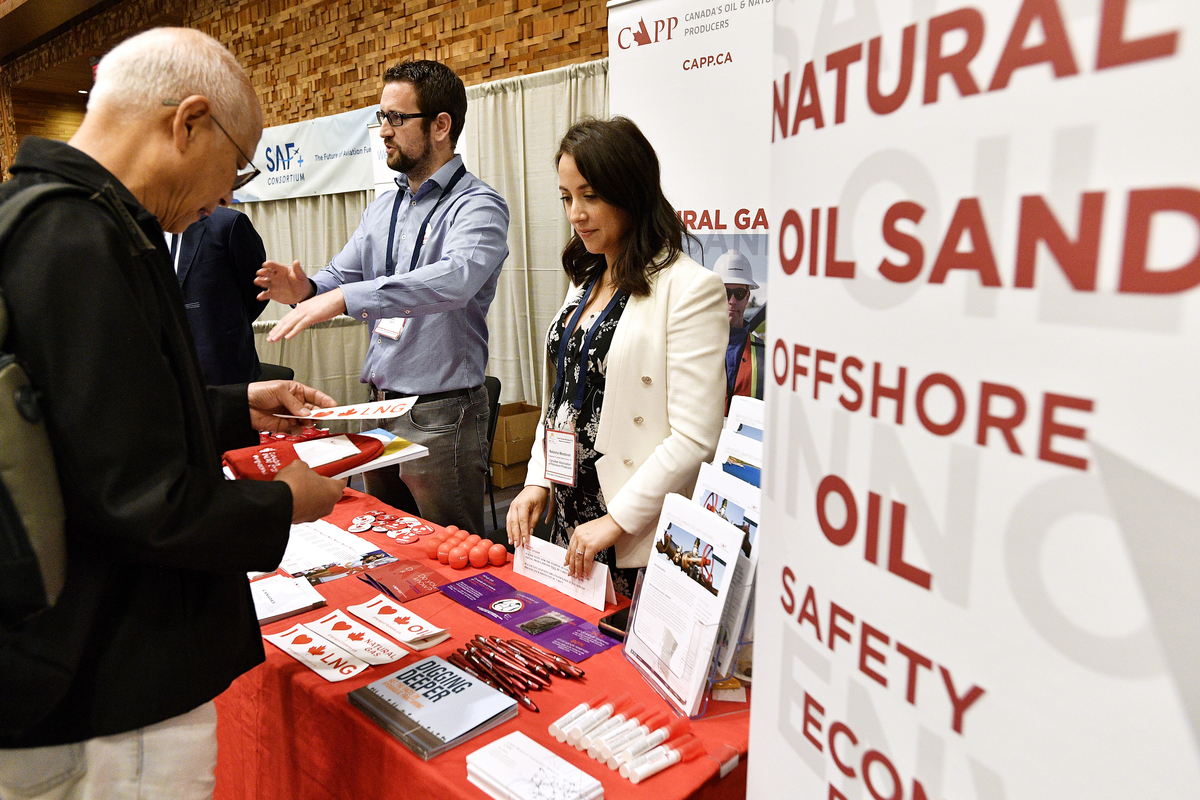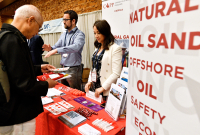Support strong Canadian climate journalism for 2025
Canada’s largest oil and gas lobby group wanted to know more about its supporters.
Their music tastes, the cars they liked, their age, their race, how far they’d go in supporting the energy industry. The Canadian Association of Petroleum Producers (CAPP) blasted the survey out to its email list in July 2018, but didn’t include terms and conditions and has since declined to say how it planned to use the detailed personal data.
This summer, as the federal election drew closer, CAPP paid for promoted Facebook ads linking to a website that asked for data in the form of a pledge. That link asked CAPP supporters to sign a “pledge to Vote Energy” — signalling support for a seven-page “Vote Energy Platform” — by entering their name, email and postal code. CAPP poured tens of thousands of dollars into sponsored Facebook posts linking to the pledge.
“Canada’s only credible path to meeting its Paris commitments is through increased exports of Canadian natural gas,” reads one part of the platform. (Experts would disagree.)
It’s not clear how CAPP — an extraordinarily powerful and well-resourced lobby group whose membership list is dominated by foreign-owned companies — is using the data it collects. It didn’t answer specific questions from National Observer, and hasn’t divulged its reasoning publicly. But CAPP’s methods mirror political strategies used by American lobbyists to halt climate policy, a National Observer investigation has found.
Experts consulted by National Observer said such data could be used to shape public opinion. By “micro-targeting” members of the public who the data suggests will be sympathetic to CAPP messaging, the lobby could build a network of industry-coordinated grassroots support in key battlegrounds in the federal election, the experts said.
CAPP’s American counterpart already uses these techniques to block climate action, and in 2015, CAPP said in a now-archived press release that it planned to adopt them. Such techniques used “north of the border could make a material difference in the public discourse over energy issues like pipeline development and hydraulic fracturing,” CAPP said at the time.
“(Data collection and micro-targeting) are a key part in building the social-media echo chambers that make people more vulnerable to one-sided messaging that reinforces highly selective and one-dimensional views of Canada and the world,” said Shane Gunster, a communications professor at Simon Fraser University who researches the oil industry’s use of social media.
In this year’s federal election, the climate crisis is a top issue for the first time. The public increasingly supports taking action on the issue, which, at the level of federal policy, has given rise to a nationwide price on carbon as well as stricter air pollution regulations. At the same time, CAPP is campaigning for the opposite: it wants the removal of emissions standards and more government support for the expansion of the fossil fuel industry, the group’s Vote Energy Platform says.
Advocacy groups of all political stripes have always tried to sway the electorate in favour of causes they support, and well-resourced ones like CAPP have always been particularly good at it, said Melanee Thomas, a political scientist at the University of Calgary and Eakin Fellow at McGill Institute for the Study of Canada.
But the data collection aspect of CAPP’s activities is an “escalation of that trend,” Thomas said. Though that escalation has been visible in the U.S. in recent years, it hasn’t yet been widely seen in Canada, she added.

In an August 2018 email, Chelsie Klassen, a spokesperson for CAPP who has since left the organization, didn’t answer specific questions about the motivation behind the survey, how many people responded and how the data would be used. The survey “was sent to Canada’s Energy Citizens (CEC) members to help us better understand their interests and improve our content,” she said.
CAPP also didn’t respond to repeated, detailed questions sent in early September 2019 about the Vote Energy pledge and how data collection fits with the lobby group’s election strategy.
“We do not respond to media requests from the National Observer,” a CAPP spokesperson said in response to a different story earlier this month.
All of this raises alarm bells, Thomas said: "Why would they need that kind of information?”
‘The same type of thing that political parties do to win’
At a Calgary event in April 2015, CAPP hosted an official from the oil lobby’s U.S. counterpart, the American Petroleum Institute (API), who made a presentation about micro-targeted campaigns. Deryck Spooner, then the senior director of external mobilization at API, was there to teach CAPP how to implement campaign strategies he tested in the U.S.
“We have won,” Spooner said, in everything from restrictions on oil and gas to climate change regulations.
In one case, an API-led group successfully opposed an attempt by environmentalists to block Canadian oil from being shipped through a harbour in South Portland, Me., CAPP said in a now-deleted press release. API also campaigned in favour of a shipping terminal for liquefied natural gas in Cove Point, Md., near Chesapeake Bay, a project that was approved by federal regulators in 2014.
In an audio recording of his speech at the event, Spooner outlined how API did it. They started by gathering detailed voter profiles through electoral records, surveys and online consumer data, he said, allowing API to micro-target its campaigns — through social media, flyers and other efforts — to areas where it could most effectively elect oil-friendly politicians and defeat policy measures addressing climate change.
“To date, we have about 32.8 million (voter profiles) in 34 states across America,” Spooner said. “That’s important because this is the same type of thing that political parties do to win… This is how we’re actually able to apply pressure on elected officials.”
Through this, Spooner said, API could “impact” 275 members of the U.S. Congress and 34 state governors, along with “thousands” of local governments. Armed with detailed voter profiles, API also built a “grassroots” pro-oil group called Energy Citizens that could mobilize to vote on key issues, Spooner said.
API grew the Energy Citizens base in part by enlisting its member companies to help recruit their employees, investors and other supporters, according to a leaked memo obtained by the environmental advocacy group Greenpeace in 2009.
In a now-archived press release about the speaker series, CAPP praised Spooner’s methods and announced its intent to adopt them.
“CAPP has begun down this road with the creation of its own Energy Citizens campaign,” the 2015 press release said.
“While it will take time to build the kind of numbers API has, it is affirming at these early stages to see what kind of a difference true grassroots engagement can make.”
Ever since public opposition to Northern Gateway — led by First Nations, local communities and environmental groups — resulted in the cancellation of the energy project, CAPP and the fossil fuel industry as a whole have worried that their traditional tools of influencing public policy and governments aren't as effective as they once were, said Gunster.
“They've put lots of resources into supplementing them with public outreach initiatives, to subsidize the participation of pro-oil constituencies in media and public debates about energy, climate and environmental politics,” Gunster said by email.
“Collecting data about Canadians who can be politically mobilized in support of the fossil fuel industry has been a central objective of CAPP's public outreach campaigns over the last several years.”

Fast forward to 2019, and it’s unclear how large CAPP’s collection of data might be.
On the Canada’s Energy Citizens website, CAPP claims to have a list of over 547,000 “Canadians fighting for our country’s energy future.” To join them and thereby get on the email list, visitors must enter their name, email and postal code.
Both the 2018 survey and the 2019 pledge were done through Canada’s Energy Citizens, which has a following of more than 220,000 users on Facebook. That’s nearly half as many followers as the Conservative Party of Canada, but almost twice as many as the NDP.
CAPP’s new strategy is “another example of the oil industry importing U.S.-style politics into Canada, to our detriment,” said Keith Stewart, senior strategist with Greenpeace, in an email.
“CAPP is using techniques that we saw developed, to be frank, in Brexit and in the U.S. around the 2016 presidential election and adapting that to the Canadian context,” said Thomas.
‘A very expensive but powerful tool’
This year, for the first time, CAPP registered with Elections Canada as a third-party advertiser. This allows it to run ads supporting candidates and parties or related to key policy issues during the election, subject to strict spending limits (on the Energy Citizens website, CAPP said its political activities are non-partisan and don’t support any candidate or party).
But this isn’t the lobby group’s first rodeo — it was active during the 2018 Ontario provincial campaign as well. During that vote, CAPP targeted specific swing ridings with pro-pipeline flyers and billboards, a campaign that was later revealed in an investigation by National Observer and the Toronto Star.
CAPP wasn’t registered as a third-party advertiser in that election. Later, the lobby group told National Observer and the Star that it didn’t have to register because pipelines weren’t an issue discussed in the Ontario election.
Kevin Taft, the former leader of the Alberta Liberal Party from 2003 to 2008 and author of Oil’s Deep State, said at the time that the ground campaign was a “warning shot.”
“Perhaps the federal Liberals and other environmental activists should regard the activities of CAPP in Ontario as a warning as to what’s coming up in the federal election,” he said.
The month after the June vote, CAPP sent out the survey — called the “2018 Energy Citizens Census” — to its email list. Screenshots of the survey were obtained by National Observer.
The survey’s stated goal was to “make better content that is more relevant to your life” by “understanding our community of energy citizens.” It included questions about personal identity, including age, employment status, gender and race. It also asked recipients about what they did with their leisure time, their views on the beleaguered Trans Mountain pipeline expansion project and their position on federal and provincial energy policies.

In her August 2018 email, Klassen wouldn’t answer questions about how many people responded to the survey, but said participation in it was voluntary. The data would be “aggregated,” she said, and used to make content similar to what Energy Citizens already publishes, “including social media posts, email content and print communications.”
CAPP declined to give details on how the information collected in the survey was protected against data breaches, and how it might be shared.
The absence of such transparency, both in the survey’s introduction and in the privacy policy statement on the Energy Citizens’ website, concerned several privacy experts and environmental researchers familiar with CAPP’s activities.
Teresa Scassa, Canada Research Chair in Information Law at the University of Ottawa, said the group is collecting “highly personalized information” that could “render a person identifiable.”
“If in fact, the information is being collected… to profile individuals and drive advertising. Well, I’m not sure any reasonable person would consider that appropriate,” Scassa said.
Stewart said surveys like CAPP’s are a “very expensive but powerful tool.”
“The more that people know about how this kind of manipulation works, the better they'll be able to resist it.”
Pledge to Vote Energy
Surveys aren’t CAPP’s only public-outreach tool.
Since June, for example, the group has spent over $58,000 on promoted posts on Facebook, according to the Facebook ad library. More than half of this — about $34,000, as of Wednesday — went through the Energy Citizens page, which heavily promotes the Vote Energy pledge.
“We can either support Canada's world-leading energy sector or lose billions of investment to other countries with weaker standards,” reads one ad linking to the pledge.
The number of people CAPP says have taken this pledge varies depending on which link you click. One page claims it’s over 16,000, but another says it’s closer to 11,000.
Though those numbers are “modest,” those people are “individuals who may play an oversized impact on social media, and in passing industry talking points on to friends, family and coworkers,” Gunster said.
The pledge presents two options: "no" or "yes." No matter which you choose, the site asks for your name, phone number, postal code and permission to contact you. It also links to a seven-page Vote Energy platform, which includes supplements for British Columbia, Quebec and Atlantic Canada — all key battleground areas in the upcoming federal vote.
“Make sure to start the conversation with your friends and family about the importance of our energy sector!” the website reads, pointing readers towards social media networks. “Ask them to take the pledge!”
That’s similar to a question from CAPP’s 2018 survey, which asked “how willing” respondents might be to take part in various efforts: sending letters to politicians, getting someone else to sign up for Energy Citizens or sharing its content online.

Though the Vote Energy campaign is not as extensive as CAPP’s 2018 survey, the personal data from the pledge could also be used for micro-targeting that can help shape public opinion, said Gunster. Together, these techniques amount to “potent resources.”
“Most important, perhaps,” Gunster said, the network of Vote Energy pledge-takers “can be used to deliver, circulate and amplify industry talking points and memes, as people are encouraged to share content within their communities and social networks” — all tactics similar to those being used by CAPP’s American counterparts — “to develop a kind of grassroots presence to legitimize its corporate power.”
“When particular projects come up ... they have a database of supporters who have been conditioned, if you will, to understand that their participation in the political process has become an essential part of securing the ongoing existence of the fossil fuel industry,” he said.
This can be seen in the Vote Energy platform, which gives the public cues about how CAPP wants to sway voters. It asks voters to choose candidates who support kiboshing federal environmental rules, rolling back protections for endangered species and putting money towards lower-emissions oil and gas projects.

Thomas also noted that parts of the platform amount to “disinformation.” At one point, it asks for government to “acknowledge that Canada’s oil and natural gas sector is not subsidized” — it is, to the tune of billions of dollars, according to the International Institute for Sustainable Development — and “acknowledge that Canada’s only credible path to meeting its Paris commitments is through increased exports of Canadian natural gas,” a point that climate modelling does not support.
CAPP didn’t answer questions from National Observer about the accuracy of the information in the platform.
The lobby group has always sought to sell the public and lawmakers on oil and gas, and has always had tremendous power and resources with which to do it, said Thomas. Because understanding oil and gas requires dense, technical knowledge, it’s a prime space for CAPP to manipulate the conversation.
“This is very much about shaping public opinion to make an already favourable context (for the industry) more favourable,” she said. "There's a knowledge vacuum there that could be exploited."
Concerns about data privacy
On its website, the Canada Energy Citizens’ privacy policy says the organization only collects information that visitors specifically and knowingly share. While Energy Citizens says it would use visitors’ personal information to “respond to queries or requests submitted by you,” it also notes that it can share that information without permission if it’s allowed by law, “or if we believe that such action is necessary to protect and/or defend our rights, property or personal safety and those of our website users or other individuals.”
The policy also says CAPP “uses a third party service provider to collect and store personal and non-personal information” using a cloud service.
“The privacy policy on the Energy Citizen’s website does not seem to give appropriate notice of purposes of collection... which seems problematic particularly before the survey,” Scassa said.
“If you look at the policy, there’s nothing on it about what’s being collected… and it doesn’t refer to surveys at all.”
According to Canada’s data protection laws, private organizations must clearly identify what information they are asking for, why they are collecting it and how they will use it.
“They need to be very clear and advise you of the intended uses of the personal information they’re collecting from you, that theoretically you should be consenting to,” said Ann Cavoukian, a former information and privacy commissioner of Ontario.

Gunster said he believes CAPP’s strategy fits current trends in political advertising. Third-party organizations like Canada Proud, for example, build lists of individuals who they can target with a mix of shareable memes and bite-sized political messages. Those individuals in turn circulate and amplify what they’re reading.
While there is a difference in how CAPP and Canada Proud are employing these micro-targeting tactics, the technique has become the go-to “central tool in strategic and political communication, and especially powerful in election campaigns,” Gunster said.
"An ad from CAPP is likely to have much less resonance with people than material passed on by those they like or know or trust.”
Editor's note: this story was updated on Sept. 27, 2019 at 11.31 a.m. EST to clarify that the CAPP spokesperson National Observer received comment from in 2018 is no longer with the organization.








Comments
#reportaclimatecriminal.
So true. Just as the United Nations established a war crimes tribunal, it will also prosecute climate crimes.
Watching CAPP is like watching dinosaurs captured in a tar pit. The tar pit awaits anyone stupid enough to step into it. Prey and predator alike cannot escape once entrapped. Step carefully Canadian voters!
Let's share this article widely...and use it in discussions of the climate action movement that we are witnessing on the ground. The public is awakening......but we will all have to get up to speed more quickly than have the activists of the last 25 years.........if we are going to anticipate the spin of the climate change deniers, and their masters in the fossil fuel industry. "Tell the Truth" signs said at our rally yesterday. We all need to begin to do that.
Knowing that the struggle against bitumen pipelines has so far been won by climate activists and ordinary people on the ground is heartening; but climate criminels who heart Oil and Gas, LNG etc. etc. more than they love this country don't give up. And going forward, their tactics can only get dirtier....and likely, more violent.
We too need to share information, talk real climate turkey with our contacts. Too many good people are still sitting this struggle out and letting deep pockets like CAPP foreclose on their kids futures....its a dead end road they're steering us down.
We certainly need to monitor and denounce these guys. They would happily wreck our common planet for the sake of a few years of riches for themselves.
“We do not respond to media requests from the National Observer,” a CAPP spokesperson said in response to a different story earlier this month.
They are worried about being denuded, revealed for the well groomed and well heeled manipulators that they are. A lobby organization, industry funded, industry steered, heavily influenced by foreign O and G corporations.... arm twisters. A propaganda organization, ...Scientific evidence does not support their boasts, so they massage and lob what scant evidence they can muster into their well selected forums to inflate public confidence that they are stewarding the environment responsibly. But the jury is in and has reached a far different conclusion. ..... So... time to oil up the the PR machinery, and to redouble manipulating the political system simultaneously.
They prey on economic insecurity, they prey on individual's tendencies toward un-examined greed, particularly in the west. CAPP likes to wrap itself in the flag as well, naturally, and to make the dubious claim both explicitly and implicitly that "We are You".... Meanwhile their cherished corporate backers progressively efface the natural environment. https://www.energycitizens.ca/